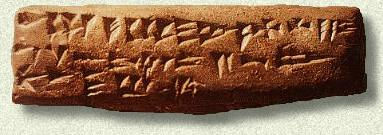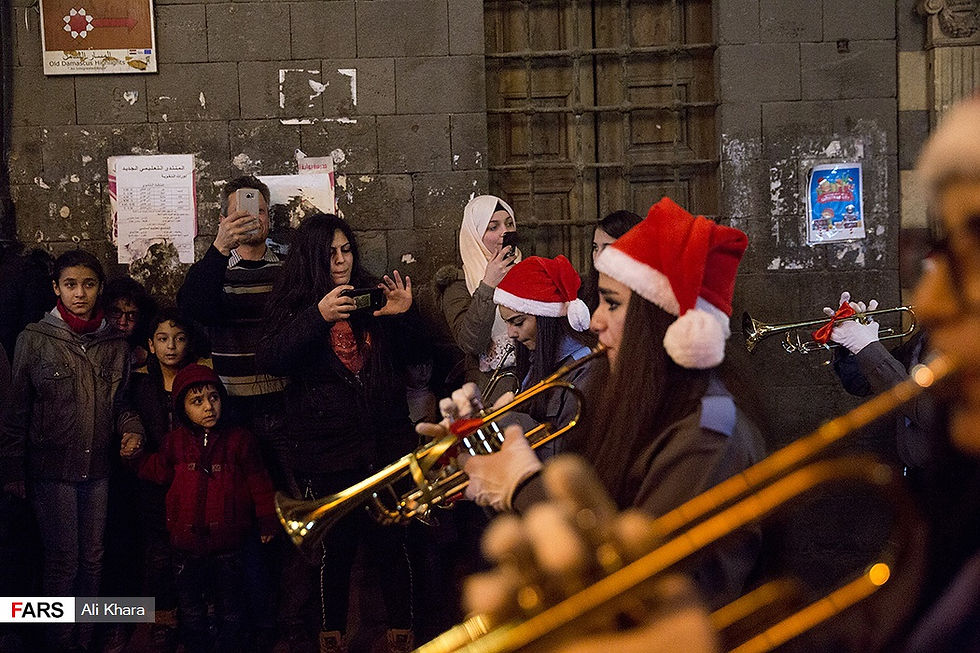Christmas in Syria
- Yoshika Lowe
- Dec 19, 2019
- 6 min read
A Brief History
Syria is home to one of the oldest cities ever excavated—Ebla-- and to two of the oldest continuously inhabited cities in the world--Damascus and Aleppo. As part of the Fertile Crescent, it is home to the earliest human civilizations. This land through which the Euphrates and Tigris rivers flow has been sought after and fought over for centuries. As such, it has been ruled over by many, many different people groups.
Ancient History
In ancient times it was occupied by the Egyptians, Hittites, Sumerians, Mitanni, Assyrians, Babylonians, Canaanites, Phoenicians, Arameans, Amorites, Persians, and with the conquest of Alexander the Great- the Greeks. As a matter of fact, in ancient Greek ‘Syria’ means ‘formerly Assyria.’ Hundreds of years later, Syria came under Roman rule. After the decline of the Roman Empire, Syria became part of the eastern Byzantine Empire. During the Arab Islamic Conquest of the 7th century, Syria came under Islamic rule. Prior to the Conquest, Aramean was the language of most Syrians.
The Middle Ages
In Christian history, Syria is where Paul was converted—on the road to Damascus. Antioch-- where people were first called Christians--was Paul's starting-point in his three missionary journeys. The middle ages brought with it the Crusades and centuries more turmoil. Over the next several centuries, Syria was held by Crusader states, Mongols, Egyptians and Mamluks.
Modern History

In 1516, the Ottoman Empire conquered and ruled over Syria until 1918. The three centuries of Ottoman rule were mostly peaceful, with Syria being comprised of modern-day: Syria, Lebanon, Israel, Jordan, the Gaza Strip, the Palestinian Authority and parts of Iraq and Turkey. After WWI, Syria came under a League of Nations mandate under French control in 1920. This mandate led to a revolt in 1925 which spread to Lebanon. After many protests, France eventually agreed to a treaty of independence in 1936, but never signed it. When France was captured in during WWII, Syria came under control of Vichy France (Nazi controlled) until the British occupied the country in 1941. France finally pulled out of Syria in 1946 and it became an independent republic on April 17, 1946.
Wars and Conflict
Unfortunately, the new country had some difficulty with sustaining a stable government. Syria has had at least twelve constitutions since its independence. In 1948 it became embroiled in the Arab-Israeli War over the establishment of Israel. In 1949 there were three military coups. The leader of the fourth coup was himself ousted in a coup in 1954 which returned the country to parliamentary rule.
In November 1956 Syria became involved in the Sinai War aka Suez Crisis aka Second Arab-Israeli War. This crisis led to Syria signing a pact with the Soviet Union, allowing a Communist foothold in the government in exchange for military equipment. This upset neighboring Turkey but brought Syria closer to Egypt because of their socialist leanings at the time.
In 1958 Syria and Egypt decided to merge their countries creating the United Arab Republic. This partnership was ended by another Syrian coup in 1961. Renamed the Syrian Arab Republic, most of the 60's were a series of coups and military revolts and civil disorder. Tensions with Israel over the Golan Heights (on Syria’s southern border and Israel’s north) and the Demilitarized Zone have been a constant source of tension since 1967, leading to clashes and even war. These were the Six Days War and the 1973 Yom Kippur War. Syria lost the Golan Heights in the former and failed in its attempt to regain the heights in the latter war.
21st Century
In the 21st century, Syria has been embroiled in a civil war. The Syrian Civil War, which began in 2011, has its roots in the Arab Spring, which led to the Arab Winter, and is also due in part to the spillover of the Iraq conflict. The Syrian Civil War is an ongoing multi-sided event that is ultimately a reaction to the actions of President Assad, who used violence to suppress discontented citizen protesters. This escalated to armed conflict, which has led to countless lives being destroyed and lost. With an estimated 400,000 casualties, the Syrian Civil War is the second deadliest conflict of the 21st century. It has also created an international refugee crisis, with more than 5 million people displaced internationally and 6 million displaced internally.
Christmas Today
Due to the war, many Christians will not be able to celebrate Christmas with a tree or decorations. Yet, in some parts of the country, including Damascus and despite the rubble, Christmas will be celebrated with a large tree in the public square. In fact, Christmas 2018 saw Damascus celebrating with the beauty and joy of lights, décor and trees. Since extremist factions such as ISIS, ISIL and other jihadist militants were expelled, Christians are for the first time since the war began, able to openly celebrate Christmas.
Contrary to the common perception in the U.S., Syria was and still is an oasis of diversity and vibrant interfaith life. In Syria, there are more than 27 different religious and faith communities who have been living together for centuries. Before the current sectarian tensions many historic religious communities lived and worshiped together for a long time.
Only about 10 percent of the nation is Christian. Christians in Syria come from the Eastern Church. The various denominations in Syria include the Syrian, Greek and Armenian Orthodox church, the Maronite Church, the Syrian Catholic Church and the Greek Catholic Church. Eastern Christians begin their observance of the season with fasting from dairy, meat, fish and eggs.
Just as in Iraq, a bonfire is part of the Christmas Eve tradition. Family members hold lit candles while gathered around an unlit bonfire. The youngest child reads the Nativity story, then the bonfire is lit. As in Iraq, Syrians also believe the flames of the bonfire will bring good luck and prosperity to the house. Many hymns are sung until the bonfire burns out, then everyone jumps over the ashes and makes a wish. Everyone will attend church on Christmas morning.
Another similarity of Christmas celebrations between Syrian and Iraqi Christians is the worship traditions. At church, a processional is led by a priest holding a figure of the Christ Child. He will initiate the ‘Touch of Peace’ which is shared by each person in the procession.
Gifts are an important part of the celebration. In Syrian culture, the camel is the gift-bringer. According to legend the youngest camel carrying the 'Three Kings' or 'Magi', was weakened by the long journey and fell down. Jesus Christ is said to have blessed the camel with immortal life. The Syrians believe that the 'littlest camel' brings gifts to the children at Epiphany on January 6th. So Syrian children leave shoes outside the night before for the camel to fill with gifts. They place hay and water beside the shoes to feed the camel.
'Milad Majid' means 'Merry Christmas' in Arabic. During the Christmas season, people embark on a shopping spree with their families as a part of an age-old tradition. Shopping is considered a major activity during the Christmas festivities.Christmas dinner will consist of chicken, lamb pastries, nuts and soft drinks. Some of the most famous Christmas dishes include baba ghannouj, Hummus, baklava, stuffed grape leaves and mezze platters.
Prayer Point
War, violence, and terrorism have shattered and decimated this nation. Hundreds of thousands have lost their lives. Millions have been forced from their homes, leading to a mass humanitarian crisis of historic proportions. What started as a civil war has become a much more complex and multifaceted conflict. With many sides and factions - armed opposition groups, rebels, the Islamic State, the Kurds - the battle lines in this war are largely unclear. War crimes, such as chemical warfare, have been reported on all sides, leading to unspeakable horrors among Syrian civilians. Capitalizing on Syria’s instability and chaos, the Islamic State (IS) has started a “war within a war” - taking control of huge areas across northern and eastern Syria. IS has brought nothing but terror and suffering to an already terrorized people.
Syria is in desperate need of the peace that only Christ can bring. Even though Christians were a minority group (Syria is 87% Muslim), before the infiltration of the Islamic State and this bloody civil war, Syrian Christians enjoyed more freedom and stability than many of the surrounding nations. But today it is one of the top ten most persecuted nations on earth as IS has kidnapped, tortured, and killed followers of Jesus in the regions they claim.
Approximately half the Christian population have fled for their lives, leaving only about 200,000 to 250,000 believers in Syria - many of which are displaced. But out of these ashes of death, new life is rising. Though many believers have fled, God continues drawing Syrians to Himself. Like the faith-filled New Testament church of Antioch before them, may of today’s small and persecuted Syrian body of believers rediscover the zeal and faith of their fathers to cause Christ’s love and hope to be poured out on a nation in great turmoil. He is their only hope.*
Pray for a swift end to the horrific civil war with people of peace rising to leadership.
Pray for Jesus to reveal Himself to the millions of Muslims displaced by the war.
Pray for the Church to be protected and expanded amid hostility.
Pray for restoration to their homes for the millions of displaced people
This is an excellent article on the Syrian refugee crisis and how to have the right attitude towards this painful situation: How to Pray for Syria and the Refugee Crisis
#Syria #Aleppo #littlestcamel #SyrianCivilWar #Damascus #TouchofPeace #refugees #refugeecrisis #ChristmasinDamascus #ChristmasinSyria
*Prayercast












Comments